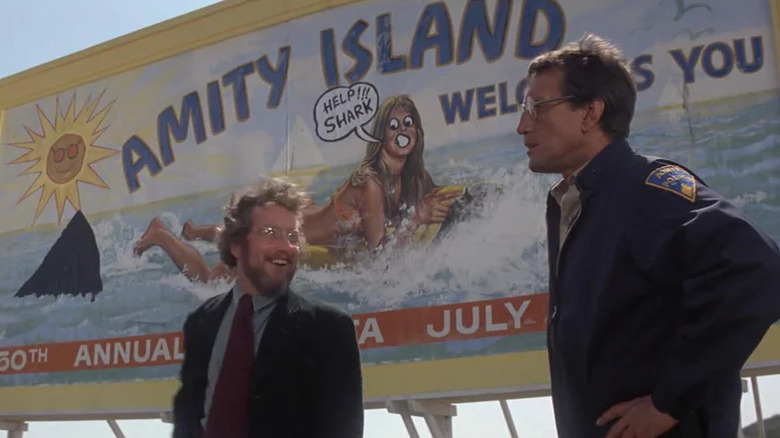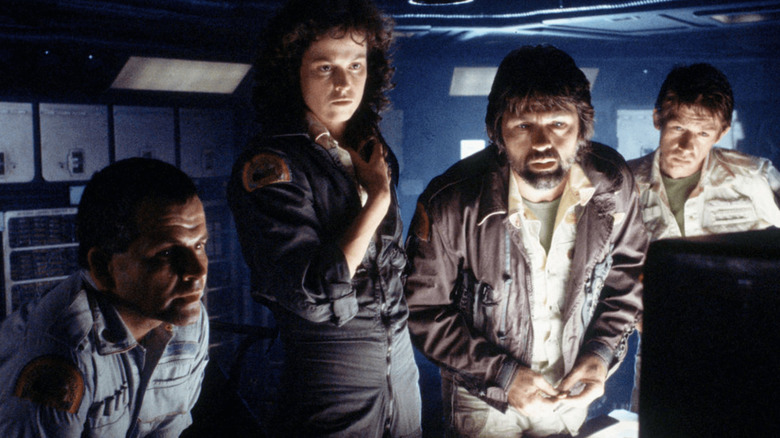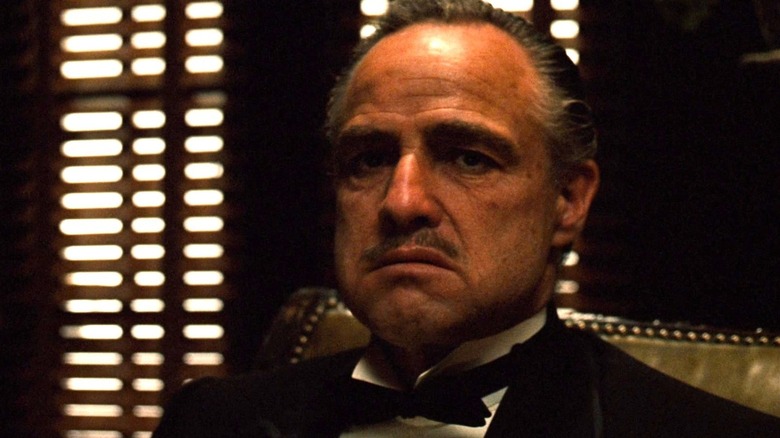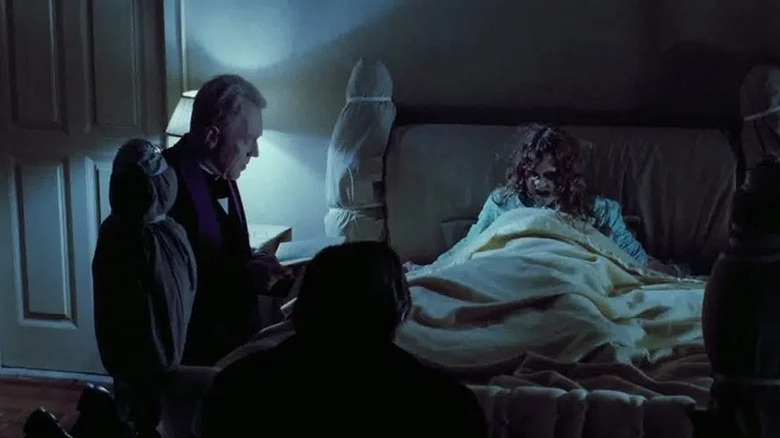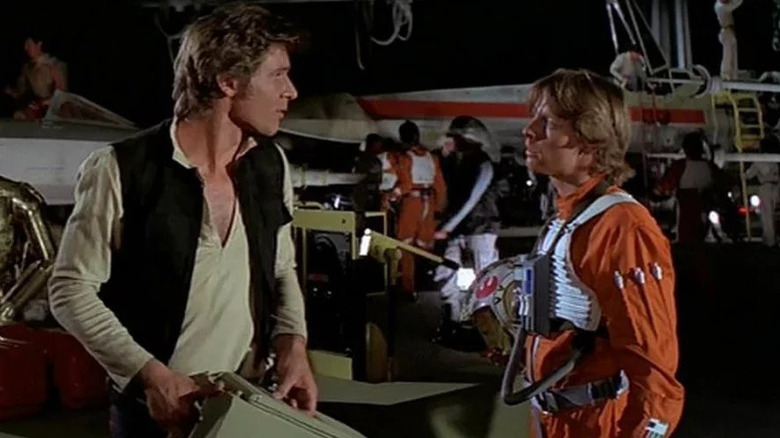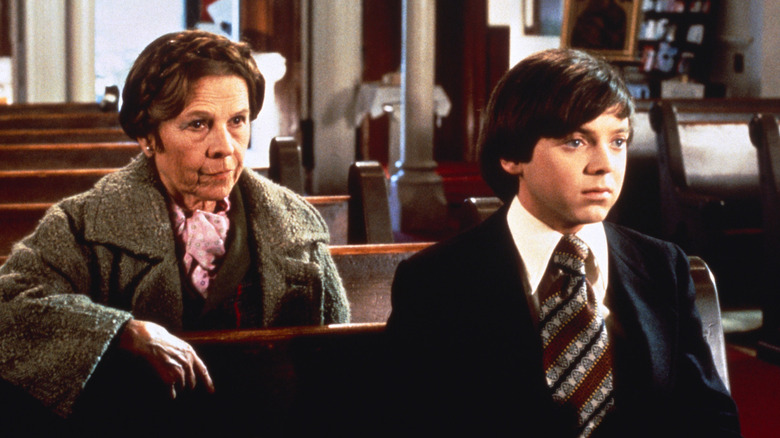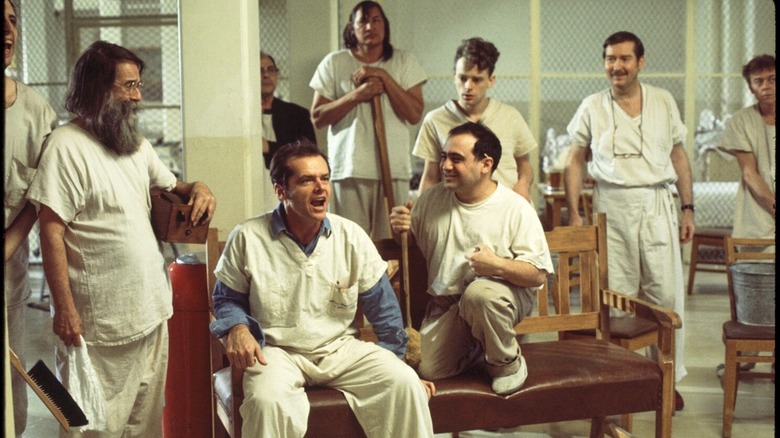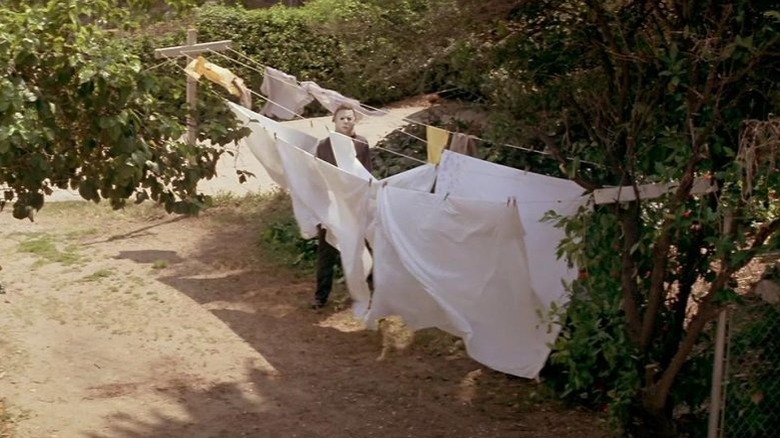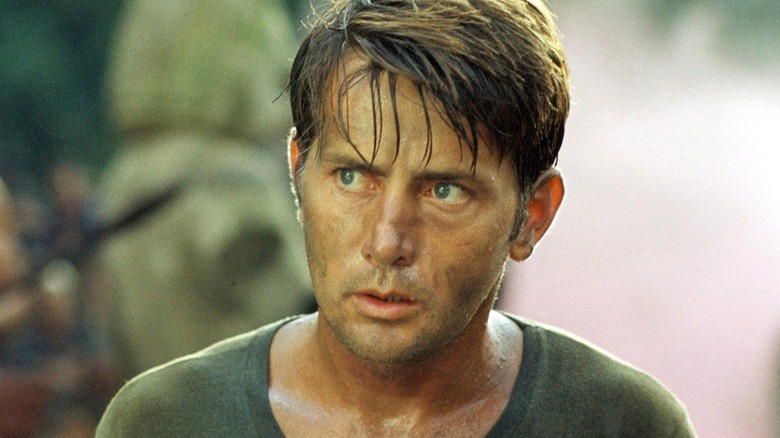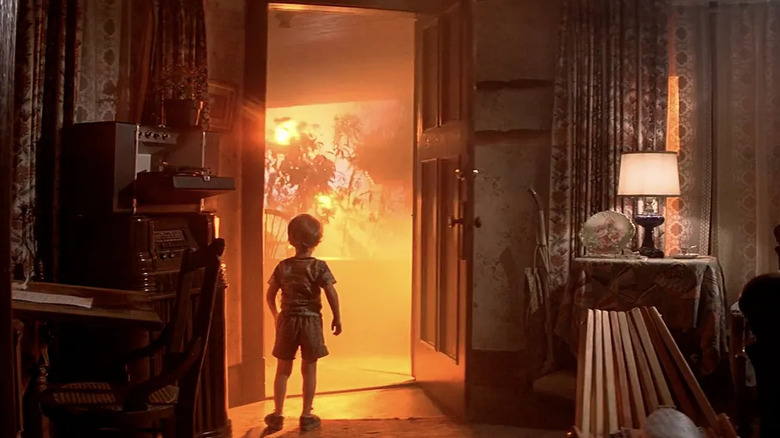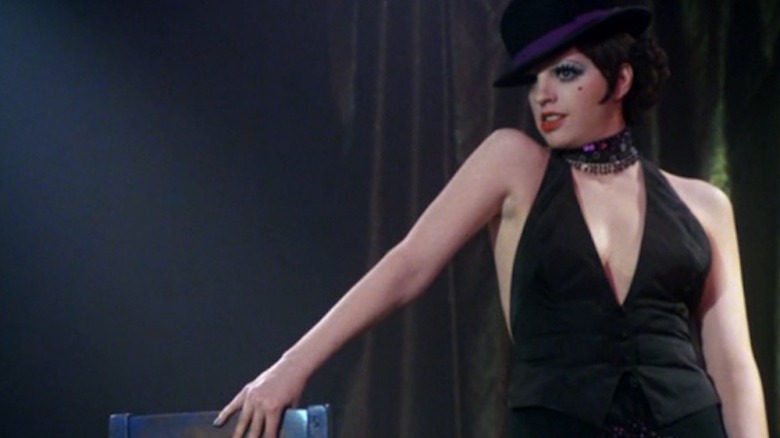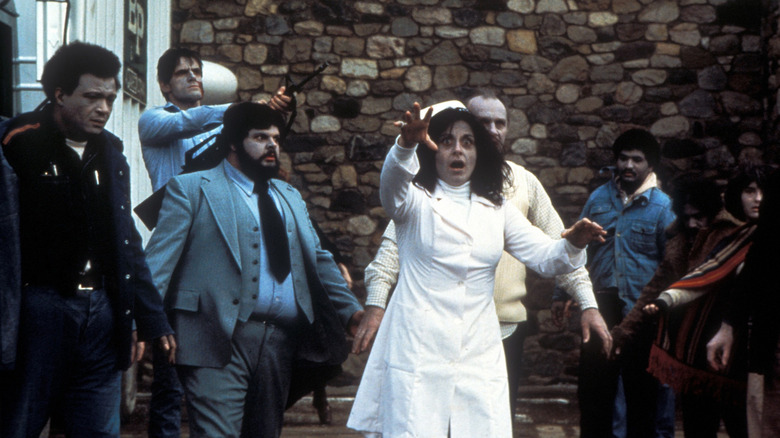12 Movies From The '70s That Still Hold Up
The 1970s were a decade of change in the United States (and around the world), from the Watergate political scandal and the Vietnam War to the pop-culture flourish of the free-love hippie movement. Add in intense cultural moments like the unexpected endings for both Elvis Presley and The Beatles, and we have an era that left an indelible mark on history — and cinema.
In fact, it was a time when movies really began to evolve and filmmakers flourished, breaking cinematic molds and releasing surprisingly raw, realistic movies that laid bare human emotions and collective societal fears. Of course, just like any other decade, some of these films hold up while others don't. After a solid 50 years have passed, our cultural norms and special effects capabilities have changed.
For example, while "Grease" and "The Rocky Horror Picture Show" are still much loved and provide a raucous good time, they both seem dated these days — although a solid argument still exists that "Rocky Horror" was trailblazing for its queer-centric storyline. They're a great snapshot of a moment in time, for sure, and people definitely still want to do the "Time Warp" and sing along to "You're the One That I Want." That doesn't mean these musicals should remain cinematic masterpieces.
Here, however, is a list of 1970s films that we feel confident still hold up upon your first view — or your 50th.
Jaws
A classic like no other, "Jaws," with John Williams' indelible dun-dun shark-attack theme song and quotes like the improvised "we're gonna need a bigger boat," still looms large in pop culture to this day. The 1975 motion picture celebrated its 50th anniversary this past year, complete with fancy shark-head whiskey bottles, LEGO sets, and other special edition offerings. Based on Peter Benchley's novel and lightly inspired by real-life events, "Jaws" put director Steven Spielberg on the Hollywood A-list and helped change cinema forever.
Not only did "Jaws" become the blueprint for modern-day summer blockbusters, it also helped push the horror genre into more suspense-driven fare. Its horror relied less on other-worldly hypothetical monsters and more on the fear of the unknown — and the way humanity can't ever fully conquer nature. Starring Roy Scheider and Richard Dreyfuss, the original "Jaws" has gobbled up almost half a billion dollars in box-office revenue since its initial release and spawned three sequels — along with countless pop-culture references along the way.
Considered a masterclass in suspense, "Jaws" remains a timeless thriller with compelling characters despite its now-dated use of practical effects. Famously, that includes the life-size animatronic shark that the cast and crew jokingly nicknamed Bruce, in honor of Spielberg's real-life lawyer.
Alien
When Ridley Scott's "Alien" came out in 1979, its science fiction storyline broke the mold when it came to horror movies — and it made sci-fi female protagonists iconic, with Sigourney Weaver's unapologetic portrayal of the no-nonsense Ellen Ripley.
The genre-bending blend of authentic grittiness, suspense, and graphic, on-screen innovations (especially when it came to the design of the villainous aliens known to fans as the xenomorphs), continues to impress viewers to this day. Meanwhile, Ripley, a member of the Nostromo's crew, is at the heart of the story when they all discover they have a relentlessly blood-thirsty extraterrestrial lifeform loose on board. She's still widely considered to be the first female action hero.
Weaver, via Ripley, also became a feminist icon, and her character remains a gold standard today. Ripley's unabashed intellect and dogged persistence make her an excellent "strong" female character, in the truest of senses. The only thing that matches her power is the chest-bursting scene that's the centerpiece of the film. It can make even today's hardened audiences still cringe in disgust and fear.
Despite a handful of now-dated special effects (mostly involving Ian Holm's Ash), the film's groundbreaking design puts "Alien" in a league of its own. The film has helped to build a lasting franchise that includes a jumble of prequels, sequels, and crossover films (and that's just on screens) that still rivet modern-day fans.
The Godfather
"The Godfather" is another movie that still resonates in pop culture, and continues to be discussed as one of the greatest films of all time. Starring legendary Hollywood heavy hitters like Marlon Brando, Al Pacino, and Diane Keaton, Francis Ford Coppola's blockbuster tale of the ruthless Corleone family and their mafia empire gave the world quotes like "I'll make him an offer he can't refuse," and "leave the gun, take the cannoli."
Released in 1972, the complex characters of "The Godfather" are a major part of its appeal. They're shaped by masterful storytelling that weaves in and out of their complex lives, encasing them with an almost grindhouse look at street violence; a bloody sort of drama that hadn't been shown on screen before. This on-screen portrayal of mafia life, with its focus on family loyalty and honor, changed the cinematic crime genre forever — and the real-life mafia families, too, as "The Sopranos" would later affectionately lampoon.
The pace of "The Godfather" may strike some contemporary viewers as slow, compared to the more action-packed movies of today. There are also some scenes (and slurs) that are pretty archaic, too. Its flaws remain counterbalanced by timeless themes, powerful performances, and a captivating, shadowy aesthetic that makes the audience part of the Corleone family.
The Exorcist
Released in 1973, "The Exorcist" made a lasting impression that has haunted horror fans for decades. Central to the trauma are the horrifying images of the demonically possessed young girl, Regan MacNeil (Linda Blair), projectile vomiting, levitating, and speaking in tongues. The film left '70s audiences aghast because of its graphic content, and was considered blasphemous by some thanks to a storyline that features Catholic priests (Max von Sydow and Jason Miller) performing what's still a controversial holy ritual — the exorcism.
A media frenzy surrounded director William Friedkin and his film after release due to the religious debate — and the mostly true rumor that some shocked viewers were fainting and throwing up in theaters across the country. Overall, the hype led to a worldwide box-office gross of $430 million. That made "The Exorcist" the highest-grossing R-rated horror movie (not adjusted for inflation) until 2017's "It" broke the record. It was also the first horror film to be nominated for best picture at the Academy Awards, though it would not win.
Despite today's fresher concerns about its underage protagonist, "The Exorcist" is still a horror classic that laid the groundwork for even more graphic horror flicks, while still holding onto its enduring shock value.
Star Wars
The world changed in 1977 when the original "Star Wars" (retroactively subtitled "Episode IV: A New Hope") was released, catapulting its fantastical galaxy into the pop culture encyclopedia. George Lucas' epic space adventure became a phenomenon that has now spanned decades, drawing moviegoers in with numerous unique worlds, classic characters, and oddball creatures.
Lucas didn't just help pioneer a generation of fresh special effects via his still-fledgling Lucasfilm studio, but he propelled his main actors (Harrison Ford, Mark Hamill, and Carrie Fisher) into blockbuster orbit. The names Han Solo, Luke Skywalker, and Princess Leia are synonymous with today's idea of heroes.
It's not just those three. Characters like R2-D2 (Kenny Baker) and C-3PO (Anthony Edwards) remain fandom icons, and the galaxy continues to grow since Lucas sold the franchise to Disney in 2012. Today, the "Star Wars" franchise has ballooned to almost unmanageable proportions, with numerous spin-offs, trilogies, toys, theme parks, and almost anything else you can name (and cash in on).
Still, the charm and wonder of the first "Star Wars" movie remains unmatched, and accessible to anyone who wants to explore the universe for the first time. It's what George Lucas wanted, for kids to have an exciting chance to learn about the importance of good versus evil.
Harold and Maude
In this day and age, "Harold and Maude" might come with a trigger warning. Its storyline revolves around a frank obsession with death (and some today may find the nearly 60-year age gap between fast friends Harold (Bud Cort) and Maude (Ruth Gordon) questionable), but this quirky black comedy still stands as one of the best cult classics of the 1970s.
The deadpan and disillusioned Harold is a directionless boarding school graduate. He finds a new zest for life when he meets Maude, a 79-year-old eccentric, when they both attend a stranger's funeral for fun. After spending years trying to get his mother's attention by dramatically faking his own death, Harold is drawn to Maude's fun-loving, carefree spirit. Together, the unlikely pair spend their days going on adventures as Maude prepares for her 80th birthday.
A colossal flop upon its 1971 release, despite earning Golden Globe nominations for both Cort and Gordon, the film spent years percolating in under-the-radar settings before emerging as a bona fide cult classic. It earned the No. 45 spot on the American Film Institute's list of 100 funniest films of all time in 2000. It currently holds an 86% approval rating on Rotten Tomatoes.
One Flew Over the Cuckoo's Nest
Long considered one of Jack Nicholson's best performances, "One Flew Over the Cuckoo's Nest" tackles its heavy themes with a number of arguably outdated tactics and stereotypes. Still, the 1975 psychological drama relies on slick humor as it follows convicted criminal Randle "Mac" McMurphy (Nicholson) as he feigns mental illness, becoming institutionalized instead of going to jail for his crime. He quickly realizes it may not be the cakewalk that he expected. Not with the terrifying Nurse Ratched (Louise Fletcher) in charge.
The film — based on Ken Kesey's novel of the same name — earned multiple Academy Awards, including Nicholson's first best actor award, and best picture. It also helped spark public debate when it came to the reality of psychiatric care.
To this day, Nurse Ratched is used as a reference to call out tyrannical and controlling authority figures, while the overall film remains though-provoking and culturally relevant. Also worth noting are terrific early performances by Brad Dourif, Danny DeVito, and Christopher Lloyd. Together, "Cuckoo's Nest" remains a tough watch, but an essential one.
Halloween
A Hollywood horror legend was born in 1978, when serial killer Michael Myers (Nick Castle) stepped onto the screen in "Halloween." Always wearing his signature rubber mask and mechanic's jumpsuit (and typically outfitted with a kitchen knife he grabbed somewhere), Myers is a decades-long staple at the movies — and beloved on Halloween itself. Even if he is usually just silently standing and staring at his potential victims.
The original film, directed by the legendary John Carpenter and starring Jamie Lee Curtis in her first feature film, is often considered to be the ultimate horror classic. It popularized the slasher genre — if not codifying it — by relying on minimalism and suspense over gore while it unleashed a relentless killer on a bucolic suburban town.
Carpenter's own synthesized "Halloween" theme song has become synonymous with suspense, turning the director into an unlikely but beloved composer. Meanwhile, Curtis has appeared in multiple "Halloween" films as the ultimate "final girl" Laurie Strode. As the daughter of Janet Leigh, the terrified heart of "Psycho," Curtis is as central to horror history as the mythology of the personification of living evil, Michael Myers himself.
Apocalypse Now
An enduring commentary on the ravaging effects of war, "Apocalypse Now" remains revered for its compelling yet disturbing storyline, masterful performances that came at a harrowing cost to its actors, and intense cinematography. Like many of the other best war films ever made, it can be hard to watch. It can even be offensive. It is also an important reminder of the psychological horror and the moral ambiguity of war.
While our insight into the Vietnam War has evolved since "Apocalypse Now," cinephiles and even war veterans consider the film to be timeless, especially when it comes to confronting the shadows of our human nature. That may be partially due to the influence of Joseph Conrad's "Heart of Darkness," the 1899 novella that inspires the film. "Darkness" remains starkly undated when it comes to the topics of imperialism and racism.
Starring Marlon Brando, Martin Sheen, and Dennis Hopper, "Apocalypse Now" follows a U.S. Army captain (Sheen) sent on a mission to assassinate Colonel Kurtz (Brando), a brilliant officer who has created his own small kingdom deep within the jungle. Kurtz may be insane when the kill order is issued. Sheen's Willard definitely is by the time he reaches Kurtz's compound.
Close Encounters of the Third Kind
Starring Richard Dreyfuss and directed by Steven Spielberg, "Close Encounters of the Third Kind" brought society's fascination with UFOs into the mainstream. Almost anthological, at its heart is the average suburban dad, Roy, (Dreyfuss), who has a life-changing encounter with a beautifully filmed but frightening alien craft. The encounter leaves him obsessively searching for answers, but he's not the only one digging.
The film came just two years after Spielberg launched the blockbuster "Jaws" — also starring Dreyfuss — and helped quickly establish the director as a mastermind who could churn out groundbreaking hits. Still, Spielberg never strayed far from science fiction, turning "Jurassic Park" and "War of the Worlds" into genre smashes.
"Close Encounters of the Third Kind" first helped Spielberg take sci-fi to new heights, however. It also flipped the script on space aliens as hostile beings, instead portraying them as misunderstood lifeforms attempting to connect with humanity — even if it features an ending which Spielberg regrets filming. Spielberg would take his love of science fiction to the next level just five years later, with the even gentler first contact flick, "E.T. the Extra-Terrestrial," in 1982.
Cabaret
The 1970s ushered in new cultural standards and cinematic milestones, especially when it came to queer representation and acceptance, and the film adaptation of the musical "Cabaret" helped to lead the charge. Released in 1972, just three years after the Stonewall Riots fired up the gay liberation movement in the United States, the Liza Minnelli-starring, Bob Fosse-helmed film featured avant-garde depictions of queer characters on the big screen. While its depictions may seem unremarkable by today's standards, at the time it was considered both risqué and risky.
Set in 1930s Berlin, just ahead of the rise of Hitler, and revolving around the seedy Kit Kat Klub, "Cabaret" remains one of Minnelli's most iconic roles, earning her a golden statue at the Academy Awards for her spirited performance. She retains a legion of queer fans to this day, assisted in no small part by the also queer-coded legacy of her mother, Judy Garland.
Based on the Broadway musical, the film adaptation of "Cabaret" took its storyline to the next level, redefining the genre by keeping the focus on the singing and dancing inside the confines of the Kit Kat Klub, in order to juxtapose the bleak drama of what was happening in the outside world.
Dawn of the Dead
George A. Romero's "Dawn of the Dead" is widely considered to be one of the best horror films ever made, and it's a level up from the director's previous 1968 "Night of the Living Dead," itself a classic. The 1978 follow-up is heralded as the genre-defining zombie apocalypse movie, expertly blending unsettling carnage with biting satire, and paving the way for a deluge of 1980s shock cinema (like "The Evil Dead"). It effectively demonstrated that a film with gory visuals and a high body count, coupled with social commentary, could be a box-office hit.
Romero himself is often placed on a pedestal by horror fans as the founding father of the modern zombie, a king of horror above even the legendary John Carpenter. His flesh-eating corpses (and their reflections on racism and society) are now a staple of the modern horror genre. Films like "28 Days Later" and "Shaun of the Dead" (to say nothing of the "The Walking Dead" franchise) owe their legacies to Romero, and there's a solid argument that Zack Snyder and James Gunn wouldn't have the influence they do today without their pretty darn successful 2004 remake of "Dawn of the Dead." As stylish as that version is, it can't keep the original zombie masterpiece down.

